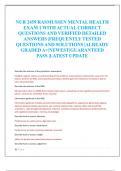NUR 2459 RASMUSSEN MENTAL HEALTH
EXAM 1 WITH ACTUAL CORRECT
QUESTIONS AND VERIFIED DETAILED
ANSWERS |FREQUENTLY TESTED
QUESTIONS AND SOLUTIONS |ALREADY
GRADED A+|NEWEST|GUARANTEED
PASS |LATEST UPDATE
Describe the sections of the psychiatric assessment:
Establish rapport, obtain an understanding of the problem, review physical status/vitals, assess for risk
factors, perform an MSE, assess psychosocial status, identify goals for treatment, formulate a plan of
care, document data
Describe the sections of the MSE:
Mental status exam or MMSE (mini mental status exam--evaluating current cognitive processes/function
(draw a clock at 10, remember these 3 words)
Information gathered in the MSE:
Information gathered includes personal information (demographics), appearance (grooming, hygiene,
tattoos), behavior (body movements, eye contact), speech (rate, volume), affect and mood (flat,
animated v. sad), thought (disorganized, coherent, suicidal), perceptual disturbances (hallucinations),
and cognition (orientation, memory, knowledge)
Describe how to assess: attention
Performance on serial sevens, digit span tests
Describe how to assess: abstraction
Performance on tests involving similarities, proverbs
Describe how to assess: insight
Ability to identify and understand present condition
Describe how to assess: judgement
1|Page
,Ability to assess a practical dilemma
What considerations should be evaluated during an interview?
Empathetic response:
Understanding the feelings of someone else "How upsetting this must be for you."
Sympathetic responses:
We feel the feelings of others "I know exactly how you feel"
Describe and give examples of Therapeutic Communication Techniques:
Silence, Accepting: Indicates the client has been understood, Sequencing: Puts events and actions in
perspective, Observations: Brings attention to the client's behaviors, Restating, Reflecting, Summarizing:
Combines the important points to enhance understanding.
Describe and give examples of Non-Therapeutic Communication Techniques:
Advising: Assumes the patient can't think for themselves.
• Minimizing: Indicates the nurse doesn't understand the client's emotions. • Falsely Reassuring:
Underrates the patient's concerns.
• Value Judgements: Prevents problem-solving. • "Why:" Implies criticism; raises defensiveness.
Define ethnicity:
Refers to a social group that shares a common and distinctive culture, religion, language, or the like. -
Latino, Asian, African American, Native American
Define culture:
Culture is the arts, beliefs, customs, and so on of a group, place, or time. - Lesbian, Christian, Anarchist,
Vegan, Japanese, Military
Ethics:
The set of moral principles of conduct governing an individual or group
Negligence:
Act or omission of an act that breaches the duty of due care and results in injury
Autonomy:
Respecting the rights of others to make own decisions, such as the right to refuse medications
Justice:
Duty to distribute resources and care equally, spending time with each patient equally
Beneficence:
The duty to act as to benefit or promote the good of others such as spending extra time with a highly
anxious patient
Fidelity:
2|Page
,Maintaining loyalty and commitment to the patient and doing no wrong to the patient
Veracity:
Ones duty to communicate truthfully
What rights do all patients have?
Right to treatment, right to refuse treatment, right to informed consent, right to withdraw, right to
privacy
What rights are limited to involuntarily admitted clients?
Freedom from unreasonable restraints, right to informed consent, right to refuse medication
Describe Duty to Warn and how it is used in psychiatric nursing:
Psychotherapists have a duty to warn a client's potential victim(s). Assess and predicting a patient's
danger of violence towards others, ID specific individuals being threatened, ID appropriate actions to
protect victims
Describe HIPPA and how it is used in psychiatric nursing
Information obtained from the patient or medical records cannot be given to anyone who isn't directly
involved in the patient's care, except in situations relating to duty to warn.
Describe when it is appropriate to use restraints/seclusion:
Used when behavior is harmful to self or others, when alternative methods are unsuccessful (verbal,
medication), when a decrease in sensory stimuli is needed, or when a patient requests it. Renewal can
only be made in increments of 4 hrs, up to 24 hrs. Must be observed every 15 to 30 minutes.
The purpose behind seclusion?
Restraints and seclusion can only be used to ensure the immediate safety of the patient, staff, and
others. They should only be used after all other means have failed to control/contain the crisis situation
SSRIs:
Fluoxetine (Prozac), Sertraline (Zoloft), Paroxetine (Paxil) Side effects: increased serotonin nausea,
vomiting. Teaching: Don't stop taking suddenly, can take with food/milk
Tricyclics:
Amitriptyline (Elavil) Imipramine (Tofranil) Side Effects: Anticholinergic, sedation, weight gain, dizziness.
Teaching: 4-6 weeks to work, it's easy to overdose.
MAOIs:
Phenelzine (Nardil) Tranylcypromine (Parnate) Side Effects: Dry mouth, nausea, drowsiness, muscle
jerks, cramps . Teaching: Avoid tyramine-rich foods (aged cheese, cured meat, beer) due to risk of
hypertensive crisis.
Recognize serotonin syndrome- S/S
3|Page
, Symptoms can occur with any of these medications and include restlessness, shivering, diarrhea, muscle
rigidity, fever, and seizures. The symptoms can be reduced by using muscle relaxers and drugs that block
serotonin production.
Recognize serotonin syndrome- nursing implications
Therapeutic measures: Discontinue, meds propranolol, dantrolene, diazepam, anticonvulsants, artificial
ventilation, paralysis.
Benzodiazepines:
Examples: diazepam (Valium), clonazepam (Klonopin), and alprazolam (Xanax) Side Effects:
Sedative/hypnotic effects
Teaching: Don't stop suddenly, notify provider of pregnancy
Concerns for client taking benzo?
Withdrawal and notify provider if pregnant.
Anti-psychotics Typical:
Examples: haloperidol (Haldol), fluphenazine(Prolixin), and chlorpromazine (Thorazine)
Side Effects: Extrapyramidal effects, parkinsonism, NMS, anticholinergic effects. Teaching: Stop slowly,
sunscreen, move slowly, routine follow-ups
Antipsychotics Atypical:
Examples: clozapine (Clozaril), risperidone (Risperdal), and aripiprazole (Abilify)
Side Effects: Seizures, agranulocytosis, drooling, weight gain Teaching: Stop slowly, smoking lowers
levels, move slowly
According to the hippocrates, what bodily fluids were responsible for illness
Blood, phlegm, yellow, bile, black bile
What therapy did Benjamin Rush create?
Humanistic therapy- caring, kindness, harsh methods(blood)
When did psychiatric nursing begin?
1873
When did the first school psychiatric nursing open?
1882
What therapy treatment did Benjamin Rush say would help those with schizophrenia
Bloodletting, purging
When did the national mental health act pass?
1946
4|Page




